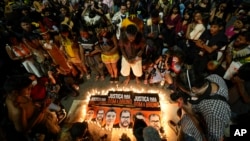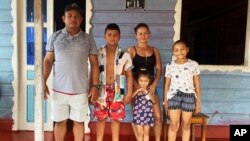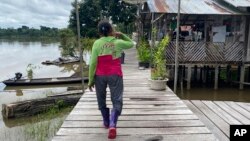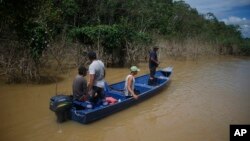One year ago on a Friday afternoon, Bruno Pereira, an expert on Indigenous peoples, and Dom Phillips, a British journalist, motored along the Itaquai river in far western Brazil, to the settlement of Ladario. The line of wooden houses here marks a boundary — between the sprawling Javari Valley Indigenous Territory in the Brazilian Amazon and the non-Indigenous world.
They were greeted by the man everyone knows as Caboclo, Laurimar Lopes Alves. Pereira’s relationship with people like him in these river communities had often been tense. Pereira had been a lead official with the nation's Indigenous agency until recently, and these non-Indigenous communities were frequent trespassers onto Indigenous land to hunt and fish. He had fought those practices fiercely, confiscating and destroying fishing gear.
But Pereira now sought a different approach. He was on leave from the government, helping to build alternative livelihoods in these remote and desperately poor communities, which receive virtually no support from the government, although they are legally entitled to it.
“I told Bruno that by the end of the month, I would harvest 700 clusters of bananas. He said, ‘I will go to Brasília and come back with a solution for you to sell bananas,’” Caboclo told The Associated Press.
But Bruno would not return. Within 48 hours, on June 5, 2022, he and Phillips, who was writing a book on how preserve the Amazon, would be ambushed and shot, their bodies burned, dismembered and buried in a shallow river grave.
As the one-year anniversary of the killings approached, The Associated Press returned to the Javari Valley to describe the backdrop against which they took place and what unfolded next.
Caboclo, 46, who cannot read and supports five children, did not find a new market for his banana harvest. Instead, the Federal Police came looking for him. They accused him of taking part in illegal fishing and took him to the nearby city of Tabatinga, where the prison is run by criminal organizations. Caboclo admits he had fished illegally in the past, but claims he stopped doing so years ago.
Ripple effects
To pay for a lawyer, his mother-in-law had to sell her house. He now lives in the city of Benjamin Constant, far from the banana grove and cassava patch that provided his livelihood. In March, when the AP met him, his home detention allowed him out four hours a day, while his fields are five hours away. Their only income now for a household of 10 is $240 per month from a federal benefit.
Caboclo was charged with participation in an illegal fish organization and spent 124 days in prison without trial, which his attorney, Mozarth Bessa Neto, says surpassed the legal limit of 81 days.
Upstream, the community of Sao Gabriel is just a few wooden houses, several of them empty. There, an AP reporter found Maria de Fátima da Costa, 60, knee-deep in the river, cleaning a wooden plank.
Da Costa is the mother of Amarildo da Costa de Oliveira, a fisherman who confessed to the killings and is in a maximum-security prison thousands of kilometers away. She agrees her son must pay for the crime he committed, but tears up recounting that her other son, Oseney da Costa de Oliveira, was also charged with murder, something he denies. He is just as far away, in a different prison.
“He is innocent. I am sure he is innocent. And his house is abandoned, his family is abandoned, everything is falling apart,” she said, with tears in her eyes. Oseney has four children, who live with his wife in Atalaia do Norte. She cleans houses now.
“The other accused individuals say that Oseney is innocent," Goreth Rubim, Oseney’s attorney, agreed. There is no concrete evidence in the federal case of his involvement in the murders, he said.
The AP sent inquiries to the Federal Police but did not receive a response.
State of the case
Amarildo da Costa de Oliveira was not the only person to confess to the killings. Another fisherman, Jeferson da Silva Lima, did too, and is also in prison awaiting trial.
Amarildo claims that military police suffocated him with a plastic bag to get his confession. Documents from a medical exam at the time show the two brothers had minor injuries after being arrested by Amazonas state police.
The agency did not reply to questions about whether the claim was investigated.
A Colombian businessman, Rubens Villar Coelho, stands accused of masterminding the crime, and is also in custody. As the owner of a floating fish warehouse outpost, he financed fishermen who ventured onto Indigenous land on trips that could last weeks. He denies any involvement in the killings.
Some see the crime as a reflection of how much Brazil's Indigenous agency, Funai, was dismantled under far-right former President Jair Bolsonaro, who long opposed the very concept of Indigenous land rights. He wanted to open the territories for economic activities such as mining and commercial agriculture.
Experiencing that pressure firsthand in his job at Funai, Pereira requested a leave of absence and when he was killed he was working as an adviser for Univaja, an organization that brings together six Indigenous peoples living in the Javari Valley Indigenous Territory. It is an area roughly the size of Portugal and home to the world’s largest population of isolated Indigenous groups, at least 16.
Pereira’s intention for communities to raise their standard of living through legal activities remains a distant reality now.
Recently a local fishermen's association reported that police were using harsh tactics against them, and managed to secure free federal legal assistance. The police and other officials "are entering homes without a warrant and confiscating fishing gear under the justification that they belong to illegal fishermen. Not all fishermen are criminals, but they are being treated as such,” it said.
The crime also changed Caboclo’s life.
During the conversation with AP, he wept recalling his time in prison.
“I didn’t know what a criminal gang was,” he said. “Now I know.”







